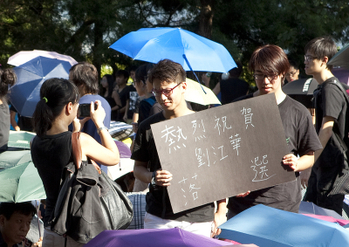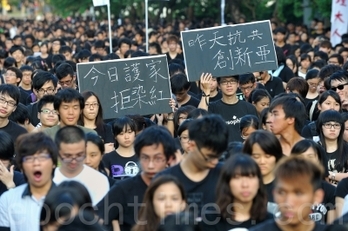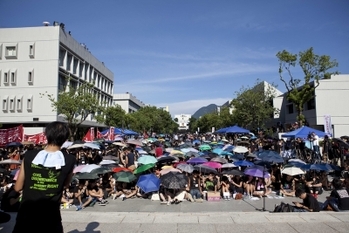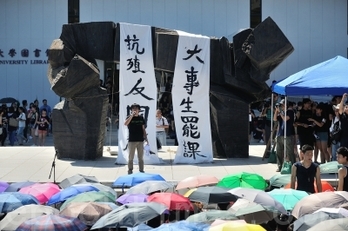Dawn over the city of sadness

Hong Kong’s last remaining dawn markets are under threat, unless the government acts now. Shirley Zhao spends a morning catching up on the banter in the illegal stalls of Tin Shui Wai
Five o’clock in the morning. The sky turns from dark blue to greyish white. The small, green river under this bridge looks somewhat murky but remains tranquil in the early morning haze. All around in this New Territories town, there’s a sleepy ambience. But a dozen hawkers – mostly elderly, with the wisdom of the years etched out on their faces – are awake on the bridge, slowly pottering about and enjoying the crisp daybreak air. They amble up with their trolleys, pick a comfortable spot, settle down and lay out their merchandise on the pavement. Soon their first customers will arrive and they will be able to sell their wares, make a fairly scant amount of money and survive another day.
Welcome to a dying breed – Hong Kong’s dawn markets. And we’re at Tin Shui Wai – one of seven early morning markets in the SAR. There used to be a plethora of these early morning traders’ havens as the city’s poor bartered and haggled for anything from the day’s first catch to the oldest trinkets and clothes. But, due to supermarkets and a more modern way of life, these markets have dwindled over the years to just seven. And, apart from two of them in the city, they are illegal. But they are nevertheless popular with shoppers and are certainly a lifeline for many of the traders who gather at them. However, soon enough, with a government which maintains their illegality, they could sadly become a part of the history books in Hong Kong.

On our visit, the market in Tin Shui Wai, a new town in northwestern New Territories, shuffles along until about 9.30am – and then there’s a sudden burst of activity. It’s the cops. “Jau gwai ah!” some alerted hawkers shout out – the Cantonese warning that the police have shown up and it’s time to go. Some hawkers get moving immediately. They hastily collect their goods, load up their trolleys and make a quick exit as two officers approach. Some stay, though, ready to take the heat – but today they’re lucky. The lawmen just slowly saunter past, seemingly satisfied by the fact that most of the hawkers are actually leaving.
This is the threat to the future of our dawn markets. The hawkers here are unlicenced, thus trading illegally. And, any day, the government could really clamp down and disband the markets. It stopped issuing hawker licences in the early 1970s. The market at Tin Shui Wai always ‘closes’ by 10am every day because hawker control officers often start patrolling after that time. But, as we see, they can certainly turn up as early as 9.30am.
Under the dotted orange lamplights, the dawn market in Tin Shui Wai is run by mostly elderly residents of the town and middle-aged housewives. They sell vegetables, fruits, herbs, dried seafood, Chinese medicine, snacks, umbrellas, clothes and an eclectic range of underwear. Some of the vegetables are grown by themselves and freshly picked from a nearby field. Near the end of the bridge an elderly man is cutting up live fish for his equally-aged customers in a makeshift basin. The air is lively with greetings, bargaining, chatting and laughing. Some people simply come to chat with one another.
By 7am, the hawkers clean up and move, pushing their trolleys about 30 minutes away to settle at another gathering spot closer to a housing estate. There are more traders here – some younger – with more customers poking around.
Lau Chi-kuen has bought some fresh herbs picked up by a hawker this morning to treat her cold. “They are fresh and not polluted,” says the 60-year-old. “You can’t find them in supermarkets. Goods are cheap here – and you can still bargain and buy things in very small amounts.” The reasons why Hongkongers like dawn markets, according to Lau, are that commodities are fresh and cheap, and that people can spend the whole morning at them in conversation with their neighbours.

With almost 61 percent of its population living in public housing, most Tin Shui Wai residents have a tight budget. The town is widely dubbed as the ‘city of sadness’ for its high rates of unemployment, suicide and family abuse – the result of highly limited commercial development and a town planning strategy which has been criticised as a ‘failure’. There are only malls (mostly run by private developers) in the town but no street shops or markets of any kind. The average monthly median family income here is more than 20 percent lower than that of Hong Kong as a whole. “Tin Shui Wai is a monopolised town,” says Athena Wong Wing-chi, project officer of the Tin Shui Wai Community Development Alliance. “The value of the dawn market is that it gives residents here a cheaper option. It’s the residents’ way to fight big private developers.”
Another important value of the dawn market, according to Wong, is that it provides a rare occasion where nearby residents can get together and communicate, as well as, at the same time, attracting those who would otherwise prefer to hide at home to come out into the community. “There are many low-income new immigrants living here,” she tells Time Out. “They often feel alienated and discriminated by society and are afraid to go out. But we find they are more willing to come to a dawn market because of the friendly atmosphere.”
Ho Ying-long is a 57-year-old father who has been a dawn market hawker for 12 years. He speaks to us after the police have shown up. He sees the markets as central to his life – but the presence of control officers makes their ultimate survival difficult and extremely uncertain. “The police are easier on us these days,” he admits, though. “Two or three years ago they were extremely strict, treating us unfairly and with a bad attitude like we were thieves.”
According to Ho, if hawkers are caught by the officers, they are fined at least $450 (the penalties increase the more times they are caught) and all of their commodities are confiscated. This is certainly a heavy blow to hawkers like Ho, who earns around $300 a day. In 2006, a 65-year-old hawker who was afraid of being caught by control officers jumped into the river from the bridge and drowned. The death was later ruled an accident. “We’re not asking for much,” says Ho, with a look of hope in his eyes. “We just want to survive. Even though I’m not earning much, I feel happy and satisfied being able to live by myself.”
Athena Wong Wing-chi says control officers have become more understanding of the hawkers’ plight recently through more communications with community groups. But that doesn’t take away the feelings of the street sellers, she says: the groups have, at the same time, been stepping up their calls for the government to legalise these markets like the old days. “It can help the poor to survive and make the community more lively as well,” she says. A spokesperson from the Food and Environmental Hygiene Department says the government ‘keeps an open mind regarding such suggestions’ but requires support from local residents as well as their district council’s agreement to proceed.
Ken Chow Wing-kan, Yuen Long district councillor and Tin Shui Wai Area Committee member, expresses his concerns. “There are complaints from local residents that the market creates noise, hygiene problems and other nuisances,” he says. “There’s also a possibility of cradling gangsters in markets like this.” Chow agrees that, with proper management, the market could become a ‘local specialty’. He suggests turning the mobile dawn market into a settled central market at premises provided by the government. The hawkers, he suggests, could join by paying management fees and organising a management committee.
Wong, however, wants to keep dawn markets in the open air to preserve the neighbourhood communications and the ‘cheerful’ atmosphere. In July, her organisation managed to get a one-month licence to start a temporary market in Tin Shui Wai. They paid $500 for the licence at a discount granted for charities and another $3,000 for ‘responsibility insurance’. They also bought necessary facilities like fire extinguishers. They call it the ‘dusk market’ because it opens at around 4pm. So it’s a start – but at the wrong end of the day.
“We hope to be able to continue doing this,” says Wong, who also admits it’s ‘unlikely’ the government will renew the licence. “Some district councillors object. They don’t want to take the risk. They would say it’s good to have a dawn market – as long as it’s not in their area.”

Our morning markets
Aberdeen
Located on the south shore of Hong Kong Island, Aberdeen is known for its floating village and restaurants harboured within its Typhoon Shelter. They are popular with locals and tourists. However less well known are the groups of people striving to make ends meet in the thriving seafood market here. Every day around 4am, hawkers gather near Aberdeen Promenade to sell their early morning catches. Most of them are middle-aged or elderly with low (or no) incomes. The market, like Tin Shui Wai, does not hold a licence.
Mong Kok
Located behind Mong Kok Stadium and opening between about 5am and 7am, Mong Kok’s dawn market is cheap and cheerful (but also unlicenced). Hawkers sell live goldfish, tortoises and common freshwater fish like danio, tetra, barb and koi. Fish food, medicine and appliances like small aquariums, lamps, pipes and pumps can also be found.
Sham Shui Po
Sham Shui Po and Tin Shui Wai are Hong Kong’s two poorest districts. Dawn markets here are really about life struggle of the poor. Hawkers are often the scavenging elderly selling what they’ve collected such as clothes, household utensils, electronic gadgets and toys – all used. But there are bargains to be had. You can buy a used radio for just a few dollars. The market is near Tung Chau Street Park, usually opening from 4.30am to 7am. And yes, it’s still illegal.
Hung Hom
Set off around 4am to Hung Hom’s Bulkeley Street and you may stumble upon treasures. It seems like everything can be found here – clothing, shoes, cosmetic products, accessories, cameras, electronic appliances, phones, books and magazines, coins, stamps, DVDs, toys and furniture – all at low prices. Customers include youths, housewives, maids and the elderly. Hawkers leave before 7am or officers will be on the scene.
Sheung Shui
Here’s one of the special brace of markets which actually does hold a licence! This 30-year-old market on Shek Wu Hui’s San Fung Avenue can safely stay open from 6am to 10am. There are around 200 stalls selling all kinds of vegetables and fruit at half the supermarket price. Fish can also be found here, freshly caught and delivered from the nearby Starling Inlet.
Tai Po
Opening from 6am to 10am, this is the other of the two legal dawn markets in town. Around 20 elderly people come here every morning to sell their farm products. The prices aren’t as cheap as you may expect but there are some rare products such as fresh roselle and homemade pickled vegetables not often seen in other places. Do come early or goods will sell out due to limited supply. It’s that popular.
http://www.timeout.com.hk/big-smog/features/52742/dawn-over-the-city-of-sadness.html









































 Wang Dan has applied for a visa to visit his parents in China many times but has always been refused by the communist regime.
Wang Dan has applied for a visa to visit his parents in China many times but has always been refused by the communist regime.







